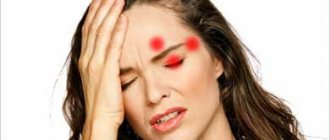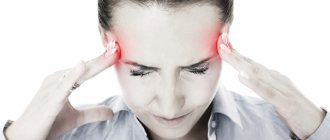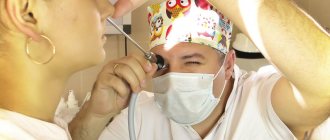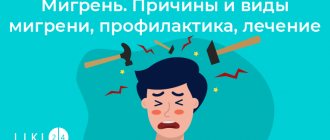What is this
Tension headache is attacks of monotonous pain of a constraining nature, usually spread throughout the entire head, sometimes with an emphasis on one area: on the back of the head and back of the head, temples or forehead and eye sockets. The most important difference from other types is symmetry: it is impossible to say whether it hurts more on the right or left. It was as if they were wearing a tight helmet.
Up to 15 days of torment per month (every other day or 3-4 times a week) is an episodic headache, and more than 15 and lasting for six months is chronic.
TTH does not require further examination, but this decision is made by the doctor, taking into account all the symptoms. Read more: Additional examination of headaches.
4. Treatment of the disease
Your headache treatment regimen depends on several factors, including the type, frequency, and cause of the headache. Not all cases require medication. Sometimes eliminating pain-causing factors or, for example, managing stress can be effective. If necessary, the doctor will select effective pills for headaches.
pain or other forms of medication. It is worth considering that self-medication and taking widely advertised pills for headaches is not the best option, especially if the pain is severe, occurs frequently or progresses. It is important to find the cause of the headache and select individual treatment that takes into account all the features of your health.
How it works
The pathogenesis of pain is not yet fully known, but the latest theory suggests the cause is a combination of abnormal neuronal sensitivity and pain; the hypothesis of muscle tension was rejected (proof). Previously, it was believed that tension and, ergo, the development of pain, arises due to sitting in a long awkward position (at the computer, of course), which leads to distortion of the spine and overexertion
muscles of the back, neck and head, which naturally begin to ache on their own - and in the process put pressure on blood vessels and nerves. Alas, such muscle contraction, according to new ideas, is only a secondary symptom.
How then do people tense up?
- Recent studies have found that with tension headaches, the main common factor in all patients with such pain is stress;
- a good addition to it is a disrupted sleep schedule;
- coupled with this is poor nutrition and periodic fasting (meaning skipping meals);
- and finally, eye strain is the icing on the cake.
How to quickly relieve an attack
In the case of periodic tension headaches, the attack can be relieved independently and relatively quickly.
Since tensor cephalgia is directly related to muscle tension and stress, therapeutic measures are aimed at eliminating tension, relieving spasms and calming the nervous system. Painkillers and antispasmodics (Analgin, Askofen, Pentalgin, Tempalgin) can provide quick help.
In addition to medication therapy, breathing exercises are an effective method. Their mechanism of action is to increase the volume of blood that enters the vessels and enrich it with oxygen. They also help relax the muscles of the neck and face, and reduce muscle pressure on the skull.
If you have a headache, you should also wash your face with cool water and gently massage your face with your fingers. It is good to combine this with a head massage and aromatherapy. If possible, it is advisable to eat a small amount of food and sleep. If the patient has diseases of the cardiovascular system, then it is necessary to take appropriate medications (Corvalol, Validol).
If an attack of tensor headache occurs due to stress, you should take sedatives (Afobazol, Tenoten), or use folk remedies (motherwort infusion).
Doctor, what will happen to me?
The most correct treatment for chronic tension pain is a rational lifestyle, see prevention.
Episodic headaches (up to 15 days a month) can be easily stopped with analgesics (the simplest ones: Paracetamol, Citramon; leave Nise and Ketanov for other cases).
If you are lazy, and pills help well more than 4 times a week, then you will soon find out what an overdose of painkillers is, so it is strongly recommended not to take a lot of medicines without consultation.
Prevention
Main article
:
Healthy lifestyle
People who constantly suffer from the described variant of headache need good activity during the day, proper sleep patterns, physical activity, proper nutrition, they need to learn to relax and go on vacation in a timely manner, spending it in active recreation, and not in front of the TV.
“What, is that all?
Doctor, I know this without you! Are you going to treat me?" - Typical patient.
No: as always, the most important treatment is not the pills, but you. In addition to you we will use:
- Tricyclic antidepressants: Amitriptyline and Imipramine (proof);
- Mirtazapine and Venlafaxine in the second line (proof);
- Topiramate and Valproate are also effective, but last.
The previously used ones have not proven their effectiveness: SSRIs (although in occasional cases they help to cope with lifestyle), beta blockers, muscle relaxants (proof once or twice).
Tension headaches
Tension headaches are most common among adults and are associated with stressful situations.
They appear periodically (episodic, less than 15 days per month) or every day (chronically, more than 15 days per month). Episodic tension headache is mild, moderately constant, band-like, with compression in the forehead, back of the head or neck.
The attack appears gradually in the middle of the day and usually lasts from 30 minutes to several days.
The patient always feels the manifestation of tension pain, but its intensity can increase with frequency and vary throughout the day. The chronic form lasts a long time, has a pulsating character, affecting the frontal, upper or lateral sides of the head, but does not affect vision, coordination or physical condition and does not incapacitate.
Who is susceptible to tension headaches?
Between 30% and 80% of US adults suffer from recurrent tension headaches and approximately 3% suffer from daily chronic headaches.
As a rule, the female population is 50% more susceptible to this disease than the male population, while the chronic form often develops among women and lasts 60 - 90 days.
Most patients have attacks of tension pain from one to three times a month, but sometimes more often.
What causes tension headaches?
There is no specific cause for tension headaches, and they are not hereditary. In some cases, they are provoked by muscle tension in the back of the head and cranium as a result of:
- inadequate rest;
- incorrect posture;
- emotional or mental stress, including depression;
- anxiety;
- fatigue;
- hunger;
- overvoltage.
But muscle tension can be a sign of another disease.
Thesis headaches are triggered by external or internal stress. The most common are family, social relationships, friends, work, school and are defined by:
- home or family problems;
- the birth of a child;
- lack of close friends;
- returning to school or studying, preparing for exams;
- start of vacation;
- change of place of work;
- dismissal;
- overweight;
- burning lines for submitting work;
- participation in competitions;
- lack of sleep;
- a penchant for pedantry;
- participation in many activities.
Episodic headaches are caused by a single stressful situation or its development, while daily stress can contribute to the development of a chronic form of the disease.
What are the symptoms of tension headache?
Patients often report:
- mild moderate pain that appears in the forehead, top or sides of the head;
- pain that appears in the evening;
- difficulty falling asleep and poor sleep;
- chronic fatigue;
- irritability;
- absent-mindedness;
- mild sensitivity to light or noise;
- muscle pain.
They appear periodically (episodic, less than 15 days per month) or every day (chronically, more than 15 days per month). The pain is felt constantly, although its intensity may vary throughout the day.
Unlike migraines, this type of pain is not accompanied by neurological symptoms (muscle weakness or blurred vision). In addition, increased sensitivity to light or noise, abdominal pain, nausea and vomiting are not always signs of tension headaches.
How to treat tension headaches?
The goal of therapy is to prevent attacks and relieve pain. Prevention includes:
- taking medications prescribed by a doctor:
painkillers;
- muscle relaxants;
- antidepressants, etc.
- management of stressful situations;
Headache treatment
For chronic tension headaches, it is recommended to take over-the-counter pain medications. If ineffective, your doctor will prescribe prescription painkillers or muscle relaxants.
Preventing an attack in chronic headaches
Preventive medications prevent headache attacks and include antidepressants, anticonvulsants, and blood pressure regulators. They are taken daily, reducing the dose, even in the absence of attacks.
Next »
More
- Headache
- Compilation article on the most common headaches;
- In what cases is it necessary to be examined?
- Recommendations for patients with tension headaches;
- Migraine;
- Cluster headache;
- More details on Medline;
- Details for people on the NHS.
| [ + ] Tension headache is detected using a hammer. | |
| Head | Headache: Primary ( Tension • Migraine • Cluster) • Secondary (Abusus • Vascular • CSF) • Additional examination of headache Concussion • VSD • Dizziness • Stroke • Dementia |
| Rest | Osteochondrosis • ALS • Sensory disorders • Paresthesia • Polyneuropathy • Guillain-Barré syndrome • Multiple sclerosis |
| Epi | Epilepsy • Classification Seizures: Absence • Treatment |
3. Diagnosis of headaches
If you suffer from headaches, do not delay visiting your doctor! In practice, a correct diagnosis of headaches helps to prescribe effective treatment and, in most cases, get rid of unpleasant sensations, including severe headaches.
In most cases, no special tests are required to diagnose headaches. The doctor will draw conclusions based on information about the symptoms and nature of the pain, information about when the headache appears, what factors cause it and then intensify. However, in some cases, a CT scan or MRI may be needed to evaluate headaches if central nervous system disease is suspected. Both of these tests provide a cross-sectional image of the brain, which can help identify abnormal areas and possible problems.
About our clinic Chistye Prudy metro station Medintercom page!
Characteristics of the pathology
Tensor pain is caused by muscle overstrain and has a pressing, exhausting nature.
Tensor headache is pain caused by spasm of the facial or occipital muscles. Localized in the frontotemporal region. Accompanied by swelling and poor circulation. Occurs in 90% of all headaches. It does not pose a threat to life, but affects human activity.
Tension type headaches are often bilateral, but can also be unilateral. It can be easily distinguished from migraine:
- pain of mild or moderate intensity, predominantly pressing, squeezing; with migraine, the pain syndrome is always pronounced, unbearable, and has a pulsating character;
- does not lead to reduction or loss of ability to work;
- does not increase with physical activity, but can be caused by excessive stress;
- not accompanied by photophobia, nausea and vomiting.
Like migraine, tension-type headache (TTH) can be long-lasting.
Types of tension cephalalgia
There are two forms - episodic and chronic tensor pain. In the first case, pain occurs monthly, attacks are repeated for less than 15 days. The duration of the pain syndrome ranges from 30 minutes to several days; on average, headaches last up to 7 hours.
Episodic tensor pain is considered common or normal. It is controlled with analgesics, so patients rarely go to the hospital for treatment.
Chronic tension headaches are characterized by high frequency and duration. With this diagnosis, the headache occurs for more than 15 days every month. The duration of the attack is from 30 minutes to several days, weeks and even months. It may be mild or not go away completely.
If tension headache lasts more than 3-4 days, the brain experiences a lack of oxygen and nutrients, and there is a risk of deterioration in brain activity.
Providing professional assistance
Frequent and chronic tension-type headaches are a reason to seek medical help from a general practitioner. A course of medication therapy may include the prescription of drugs to normalize blood pressure, tricyclic and tetracyclic antidepressants, reversible monoamine oxidase inhibitors, painkillers, relaxants and sedatives.
Atypical benzodiazepines and muscle relaxants are often used to treat headaches.
In addition to drug treatment, it is also recommended to consult a psychotherapist or psychologist. Since tension headaches are often caused by stress and psychological factors, correction of the psycho-emotional state is required, the fight against a person’s internal problems and existing fears.
A psychologist can also help in correcting and developing a line of daily behavior. One effective method is autogenic training.
Physiotherapy methods can be used to treat tensor cephalgic syndrome. The most effective for relieving spasms of the muscular system and normalizing the functioning of the nervous system are massage of the collar area, reflexology, massage shower, warm baths and electrosleep.
Comprehensive treatment may also include physical therapy and post-isometric relaxation.
Among the treatment methods, biofeedback should be highlighted. During the procedure, with the help of auditory, visual, tactile and other stimuli, the patient develops the skill of recognizing and regulating muscle tension, pressure, heart rhythms and other processes occurring in the body.
Seizure prevention
Attacks of tensor headaches can be avoided if you follow simple recommendations:
- Reduce or completely eliminate the source of stress . To do this, you need to try to change your lifestyle, your daily routine, and give up unfavorable habits. Perhaps you should make changes to your social circle and stop communicating with people who bring negativity and are an irritant. Events that cause stress should be avoided.
- Get into the habit of playing sports . This will help increase the overall tone of the body, improve blood supply, and also help get rid of negative energy.
- Follow the regime and make the place to sleep as comfortable as possible . You should use a mattress and pillows that do not contribute to the curvature of your back and neck.
- Set up a workplace . It is necessary to ensure a comfortable working environment: a comfortable chair, the correct distance and height of the monitor (so that you do not need to lower your head while working). It is recommended to set aside time for gymnastics and eye exercises once an hour.
- To refuse from bad habits.
- Spend more time outdoors.
- Follow a healthy diet.
- Use herbal teas that have a sedative effect.
- Diversify your life , add sources of positive emotions and new pleasant experiences.
When to see a doctor
If vascular disorders are suspected, an MRI of the head is prescribed.
For attacks of chronic pain, you will need to consult a doctor. The patient needs to undergo examination to find out the provoking factor. Pain in the neck and back of the head can cause osteochondrosis of the cervical spine, so the doctor prescribes a CT scan or radiography. If vascular disorders are suspected, an MRI or angiography will be required.
Self-medication for frequent and severe attacks of tensor headache is unacceptable. Constant use of painkillers is harmful to health. You also cannot tolerate pain, since muscle spasms cause blood vessels to spasm, causing the brain to become hypoxic.
Tensor headaches prevent you from thinking clearly and preventing you from enjoying life. To understand the seriousness of the problem and find the cause, you need to write down in a diary how often your headaches hurt, what contributes to the pain, and how long the attack lasts. This information will help the doctor make the correct diagnosis and prescribe effective treatment.
Clinical manifestations of tension headaches
Most often, the appearance of tensor pain is influenced by muscle spasm in the cervical spine.
Tension pain begins in the occipital or frontal part, then spreads to the entire head. Sometimes it manifests itself as pulsation in the temples. Patients describe their condition with TTH as if they are wearing a tight hat, helmet, or hoop that puts a lot of pressure on their head.
Headache is sometimes accompanied by the following symptoms:
- worsening mood, depression, fatigue;
- decreased concentration, memory, fog;
- loss of appetite;
- increased sensitivity to light and sharp sounds.
These symptoms are more likely to occur during prolonged attacks.









